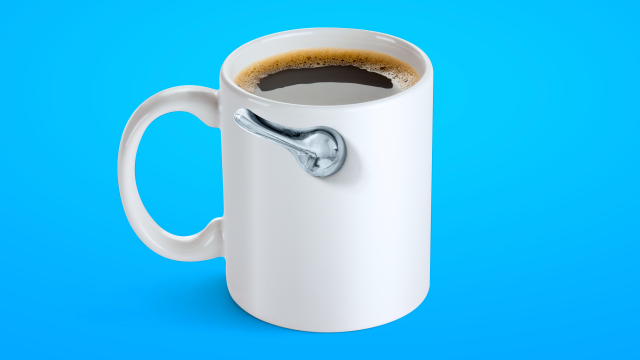A good chunk of regular coffee drinkers know that coffee isn’t just great at getting them awake in the morning—it also makes them get up and go poop. But while coffee’s laxative powers are well-known, it’s not clear why exactly this happens.
To get to the bottom of this mystery, some scientists decided to do exactly what you’d expect scientists to: giving lab rats some coffee.
Their preliminary results, presented this weekend at a research conference aptly named Digestive Disease Week, seem to reaffirm a suspicion that coffee’s poop-making prowess has nothing to do with caffeine. Coffee might also kill off bacteria found in our guts.
Researchers at the University of Texas Medical Branch at Galveston fed their rats a tiny cup of joe for three days straight, with different groups getting both caffeinated and decaf coffee. Then, the researchers checked the downstairs plumbing of the rats with a physical examination and probe, focusing on the muscles that contract and help guide food (and eventually waste) through the gut.
Lastly, they also studied how muscle tissues from the gut directly reacted to coffee in the lab. Their results were clear: muscles in the small and large intestine were more able to contract post-coffee, meaning things could move faster along the gut.
“Coffee has this stimulating effect on gut motility, and that is not related to caffeine at all. We could see this even with decaffeinated coffee, so it’s caffeine-independent,” lead author Xuan-Zheng Shi, an associate professor in internal medicine at the university, told Gizmodo over the phone.
This study isn’t the first to suggest that the gut’s muscles are directly affected by coffee. As far as back as 1990, researchers found that healthy people who self-reported themselves as coffee-poopers had more movement of their colon muscles after drinking black coffee than did those who said they never felt the urge.
As with the current study, the effects could be seen even when people drank decaffeinated coffee. And given the short time it took to see these contractions — within four minutes — the researchers of the 1990 study speculated that coffee could be acting indirectly on the colon via the small intestine or stomach.
It was this same study that established not everyone feels the need to poop post-coffee; it’s really only around 30 per cent.
Shi and his team didn’t stop at studying the gut directly, though. They also looked at rat poop. Compared to poop made with no coffee involved, they found, there were less total bacteria in the coffee drinkers’ poops.
And when they dunked poop into a petri dish and exposed it to a solution made with 1.5 per cent coffee, bacteria stopped growing as much; the same but stronger effect could be seen when they exposed them to 3 per cent coffee. As before, decaffeinated coffee produced similar results.
“That’s really interesting, because that means coffee could be an antibacterial agent, and we could see this again with decaffeinated coffee,” Shi said. “But that we need to study more—why coffee could have this suppressing effect on the microbiome.”
At this point, it’s too early to say how precisely coffee could be affecting the microbial ecosystem in our gut, known as the gut microbiome. We do know that the gut microbiome is a delicate environment, and if coffee is getting rid or slowing the growth of bacteria largely considered healthy, that would be bad.
On the other hand, other research has sure of anything).
Other studies have shown an association between the gut microbiome and a healthy moving gut. But it isn’t entirely clear how the former affects the latter, nor are Shi and his team saying that coffee’s effects on the gut are definitely working through the microbiome—just that they’ve found an interesting link to keep looking into.
Even if gut bacteria do play a role in coffee’s ability to make us poop, it’s probably not the only mechanism involved either. So there needs to be more research done to untangle all these varying influences.
Regardless of the how, the authors also said it’s worth exploring if coffee should be used as a relatively easy way to help people with constipation or a temporarily frozen gut, two complications that can happen following certain surgeries. Shi and his team also plan to have their current study published in a peer-reviewed journal within the next few months.
Meanwhile, for those of you wondering—there remains little good evidence that taking coffee the other way through your body, aka a coffee enema, provides any health benefits or “detoxifies” you in any meaningful sense.
